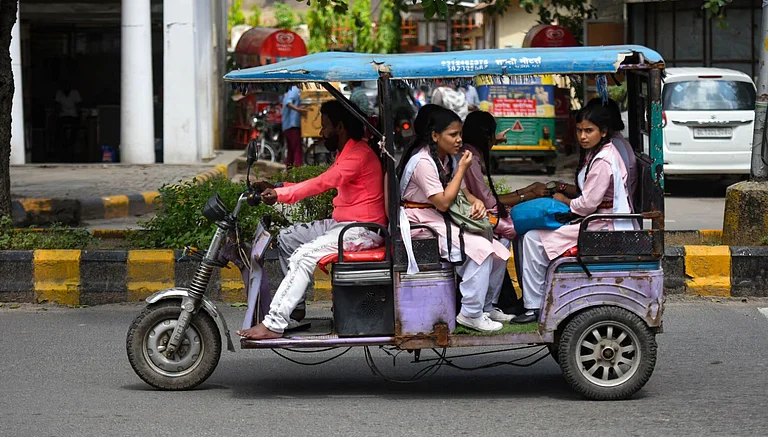BOMBAY'S rationing department and the crime branch are cracking down on the latest brand of highway robbers—the petrol adulterators. Over a month ago, 16 oil tankers were raided and 17 people picked up for filling them up with spurious petrol. In the past eight months, 131 oil tankers have been seized from Kalamboli, Talora, Turbhe and other New Bombay areas. Of these, 19 were bridging tankers headed for Andhra Pradesh, Karnataka and Gujarat. Part of the oil was also meant for Aura-ngabad, Jalgaon and Nagpur in Maharashtra.
The modus operandi is elementary. Tankers, owned by private parties, ferrying petrol and other chemicals for Indian Oil, Bharat Petroleum, Hindustan Petroleum and Indo-Burma Petroleum, stop at secluded spots just off Bombay. Petrol is pilfered and, in its place, naphtha and other chemical solvents (pen-tane, mineral turpentine oil and thinners) are substituted. The process is rounded off with the addition of a reddish-yellow dye to naphtha, a solvent which clones the boiling and distillation points of petrol. The resultant solvent gives the perpetrators less mileage but more money, causing, over a sustained period of time, irreparable damage to vehicles and the environment.
While petrol costs Rs 24 a litre, the new mix costs less than Rs 10. Therefore, if the capacity of the tanker is 12,000 litres, the owner pockets over Rs 1 lakh per tanker. Says Apurva Chandra, controller of rationing, Bombay: "Each adulteration site rakes in nothing less than Rs 15 crore a year. Assuming there are four such sites in New Bombay alone, these racketeers make a net profit of Rs 50 crore per annum. You can well imagine the situation upcountry where such raids are few and far between."
Law-enforcing authorities believe that the underworld is involved in this racket. Addressing the action plan committee this fortnight, Sanjay Pande, DCP, economic offences cell, agreed that considering the number of petrol pumps run by individuals or groups unregistered with the oil companies but on a 'power of attorney' basis, the involvement of the underworld is highly possible. Claims Chandra: "Oil companies grant licences for the running of petrol pumps to certain people—those falling under the scheduled caste/scheduled tribe or the handicapped category. Further, financial backing comes from the underworld and since the profit margins are not so spectacular in straight dealing, they resort to malpractices." Coupled with unscrupulous transport dealers is the easy availability of naphtha in the predominantly chemical industrial areas of New Bombay.
Oil companies employ restrictive procedures to restrain pilferage and adulteration, which are rampant along the peripheral areas of the major loading points. Says P.K. Roy, Hindustan Petroleum's executive director, operations and engineering: "Once tankers are loaded, coded seals are put at the outlet points of the tanker. These specially embossed seals cannot be broken without mutilation. The company also has to be notified if the standard trip time from storage point to the petrol pump is exceeded and of breakdowns, if any, en route. Besides this, the checking of the density is done at the receiving location and since only a density variation of 0.003 is permissible, the chances of adulteration are reduced."
But the stringent security measures are obviously not enough. The failure of density checks and loopholes large enough to let the culprits get away have resulted in transport buggies like—Shree Laxmi Road Lines, Nagambika Bulk Carriers and Reliable Transport, to name a few—figuring time and again in various raids. Interestingly, some of the operators ferrying naphtha are licensed by oil companies to carry their products, thus facilitating a smooth transfer from a legal to an illegal consignment. Investigators do not rule out the use of connections in the right places for awarding such 'shady' licences.
But, more often, at the receiving end of the raw deal are oil companies which have been advised to streamline their operations. Oil company officials point out that many pumps violate terms of agreement. Says Roy: "Since supplies to customers are made in customer-nominated trucks, the responsibility for quality and quantity is that of the customer's. They should be alert and report irregularities to the law-enforcing authorities. We cannot police each and every truck." Efforts to evolve effective checks and to fit tank trucks with tamper-proof totalisers that match the total number of deliveries with the quantity delivered in the carrier are in the offing. But unless the three institutions involved directly in the anti-adul-taration drive—oil companies, the police and the rationing department—are fuelled with perseverance, it may not necessarily be a smooth one.


























